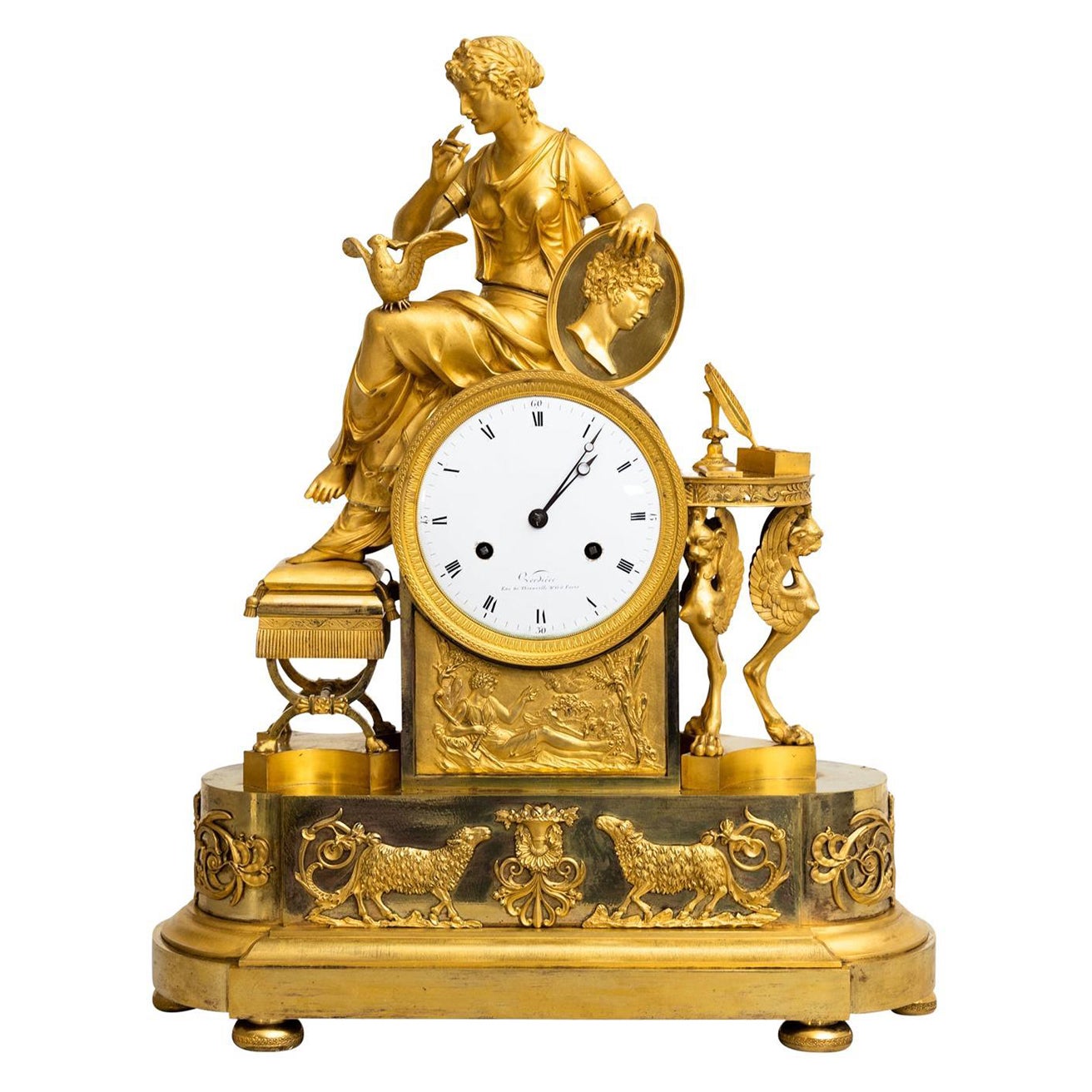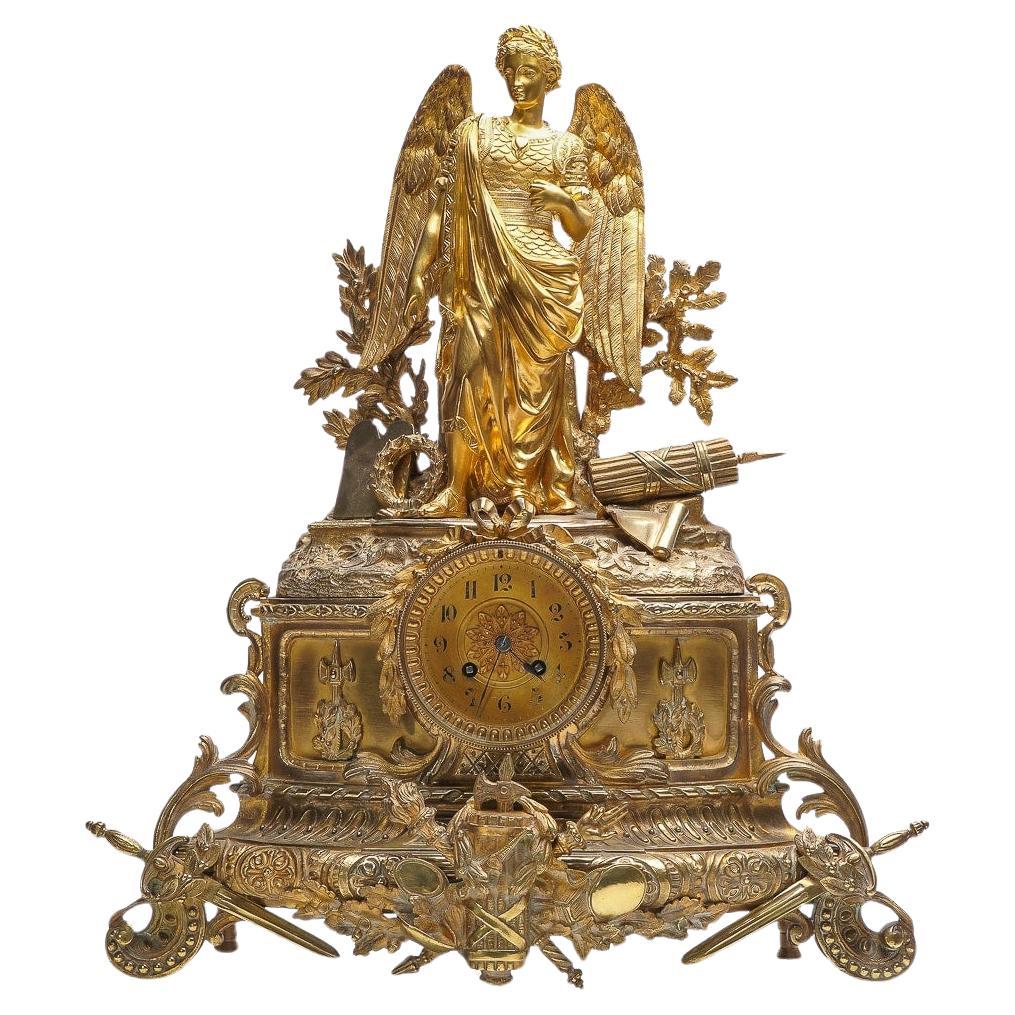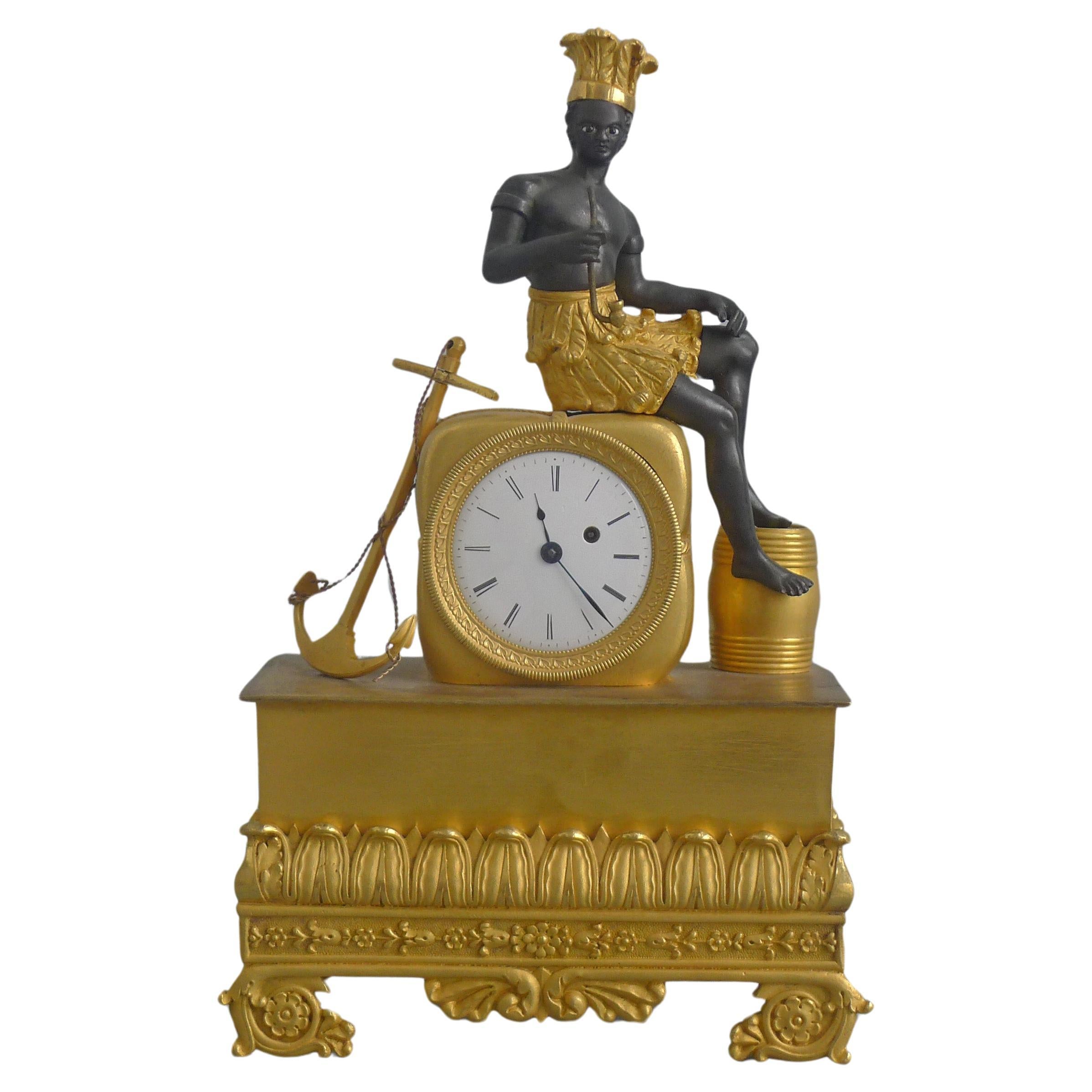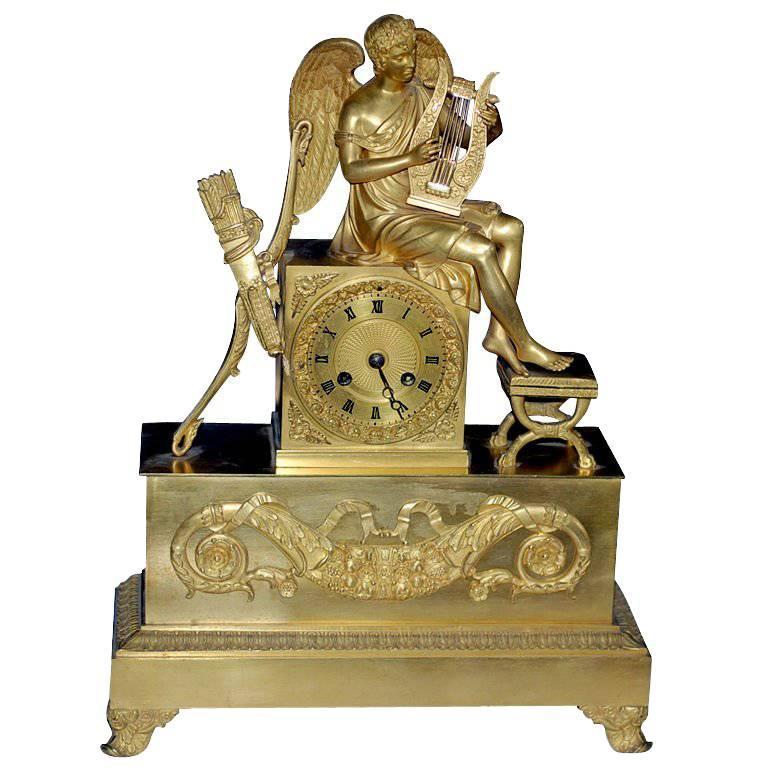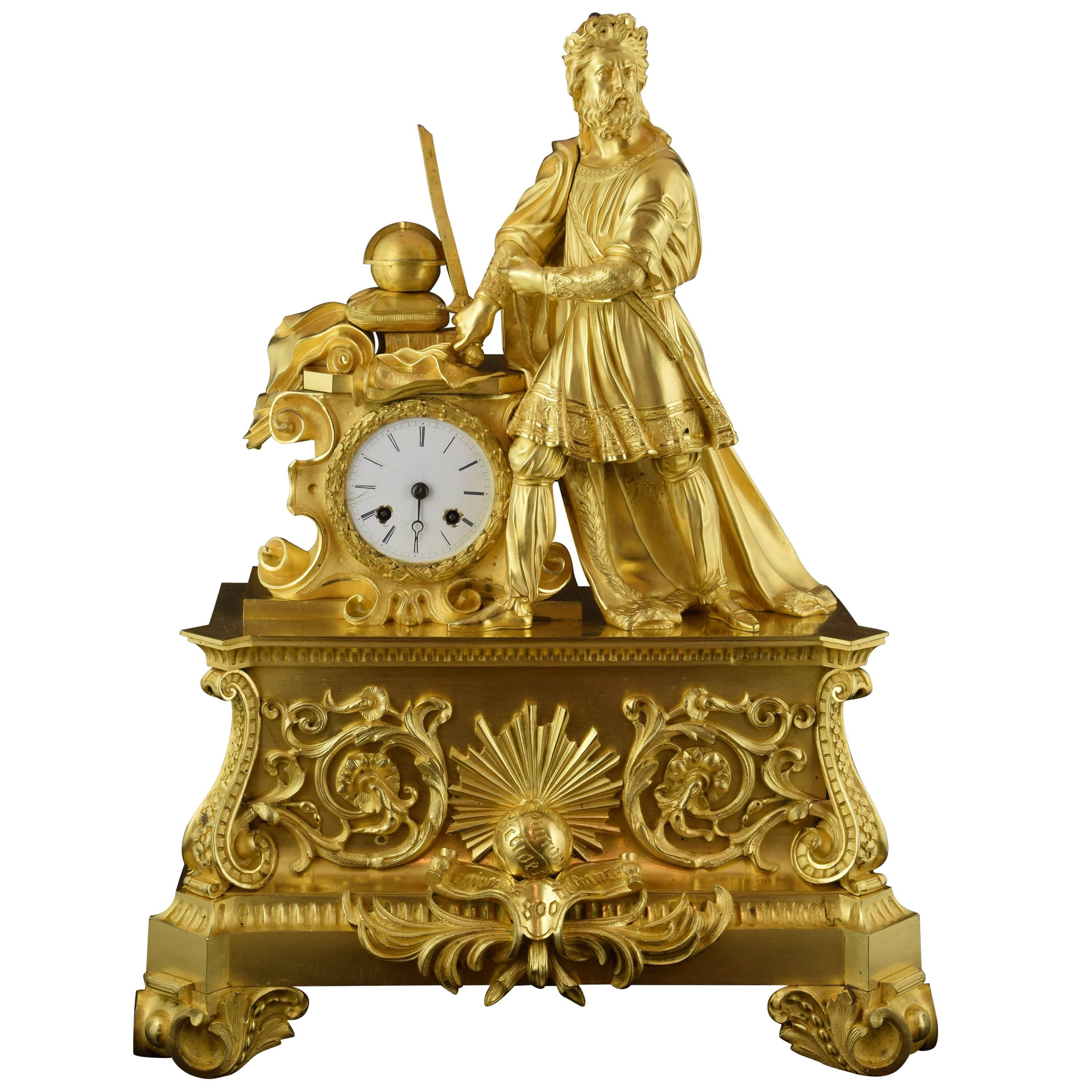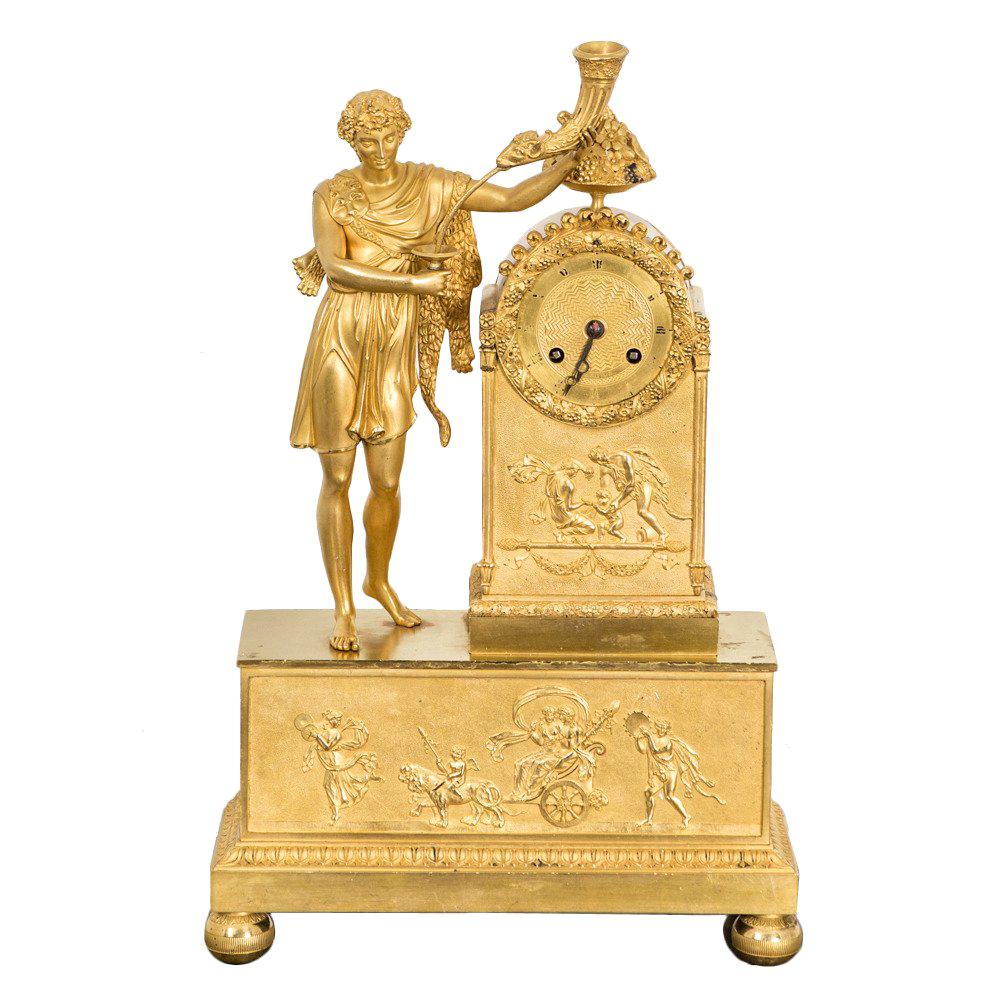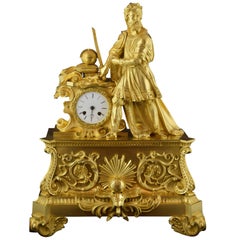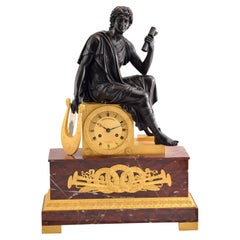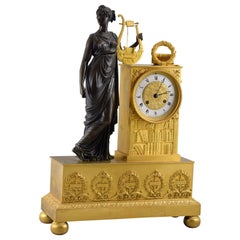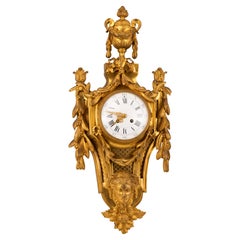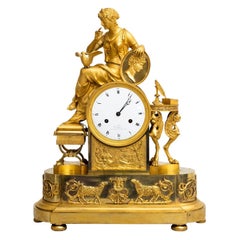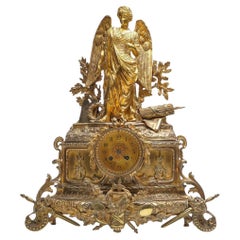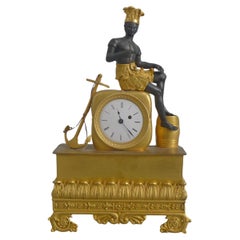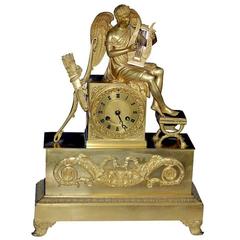Items Similar to Table clock, Aníbal Barca. Ormolu bronze, metal. France, 19th century.
Want more images or videos?
Request additional images or videos from the seller
1 of 16
Table clock, Aníbal Barca. Ormolu bronze, metal. France, 19th century.
$13,679.70
£10,191.81
€11,500
CA$19,192.49
A$21,087.05
CHF 10,874.46
MX$252,644.22
NOK 138,072.14
SEK 129,575.10
DKK 87,606.67
About the Item
Table clock, Aníbal Barca. Ormolu bronze, metal. France, 19th century.
Table clock with Paris machinery and a case made of mercury-gilded bronze. in mercury-gilded bronze, with a rectangular base on four rectangular base on four legs (the front ones decorated with scrolls and decorated with scrolls and ending in claws), decorated with a series of mouldings in relief with vegetal and architectural elements. vegetal and architectural elements in relief. The dial The dial (metal with Roman numerals for the hours) is set within a square shape, on which sits the male figure that decorates the piece. A bearded man, dressed in armour (a muscular loriga or cuirass) and a cape fixed over one shoulder with a fibula, resting his left arm on the helmet holding a rolled-up document, and with his left hand document, and with his left hand he holds a Roman standard (another Roman standard (another is broken, under his foot). Note, to the right and next to a sword, a vase full of rings.
vase full of rings.
Hannibal Barca (247-183 BC) was a Carthaginian general and statesman who was well known for his Carthaginian general and statesman, well known for his the ancient Roman Empire. No He was often depicted as counting the rings of fallen Roman knights in
the fallen Roman knights at the battle of Cannas (216 BC). , as can be seen in the sculpture by
sculpture by Sébastien Slodtz (made in 1704, Louvre Museum, Paris), where he also carries a Roman banner. Roman standard. With these two elements (vase with rings and with rings and a banner) is also shown on a table clock in the table clock in the Musée de Cagny in Paris, made during the French during the French Restoration. And we know of another in a private collection, inspired by this clock, designed according to models by Peirra-Francois
Feuchère. These two models would probably have probably served as inspiration for the present table clock.
Weight: 25 kg.
- Measurements: 53,5x20x76 cms.
International Buyers – Please Note: for those articles that need Export Permits (those older than 100 years), the obtaining of the Permit will be processed without additional expenses (if you choose the seller sends it to you), but the period for the obtention of it may vary from 10 to 35 days.
- Dimensions:Height: 29.93 in (76 cm)Width: 21.07 in (53.5 cm)Depth: 7.88 in (20 cm)
- Style:Neoclassical Revival (Of the Period)
- Materials and Techniques:
- Place of Origin:
- Period:
- Date of Manufacture:19th century
- Condition:Repaired: Machinery, sphere. Wear consistent with age and use. Minor fading.
- Seller Location:Madrid, ES
- Reference Number:Seller: zf12301stDibs: LU2951339844772
About the Seller
4.8
Vetted Professional Seller
Every seller passes strict standards for authenticity and reliability
Established in 1985
1stDibs seller since 2017
352 sales on 1stDibs
Typical response time: 18 hours
- ShippingRetrieving quote...Shipping from: MADRID, Spain
- Return Policy
Authenticity Guarantee
In the unlikely event there’s an issue with an item’s authenticity, contact us within 1 year for a full refund. DetailsMoney-Back Guarantee
If your item is not as described, is damaged in transit, or does not arrive, contact us within 7 days for a full refund. Details24-Hour Cancellation
You have a 24-hour grace period in which to reconsider your purchase, with no questions asked.Vetted Professional Sellers
Our world-class sellers must adhere to strict standards for service and quality, maintaining the integrity of our listings.Price-Match Guarantee
If you find that a seller listed the same item for a lower price elsewhere, we’ll match it.Trusted Global Delivery
Our best-in-class carrier network provides specialized shipping options worldwide, including custom delivery.More From This Seller
View AllTable Clock, Ormolu, 19th Century
Located in Madrid, ES
Table clock made of gilded bronze with a powerful base, enhanced with legs decorated with vegetal and architectural motifs of classicist inspiration and a series of details on the fr...
Category
Antique 19th Century European Neoclassical Mantel Clocks
Materials
Bronze
Table Clock, Apollo, Bronze, Marble, Model of Lenoir-Ravrio, Louis-Stanislas
Located in Madrid, ES
Table clock, Apollo. Bronze, marble. Model of Lenoir-Ravrio, Louis-Stanislas(1783-1846). Paris, around 1820.
Table clock composed of a staggered rectangular base made of red veined...
Category
Antique Early 19th Century French Neoclassical Mantel Clocks
Materials
Bronze, Other
Table clock with Muse and writers. Bronze, Paris movement. France, 19th century.
Located in Madrid, ES
Table clock with Muse and writers. Blued and gilded bronze, Paris movement. France, 19th century.
Perfectly working mechanism.
Table clock in blued and gilt bronze with Paris mac...
Category
Antique 19th Century French Neoclassical Revival Mantel Clocks
Materials
Bronze, Other
Wall clock. Gilt bronze. France, 19th century.
Located in Madrid, ES
Wall clock. Gilt bronze. France, 19th century.
Gilt bronze wall clock of the type known as a "cartel" due to its shape, featuring Parisian movement and a white dial with Roman numer...
Category
Antique 19th Century French Neoclassical Revival Wall Clocks
Materials
Bronze, Other
Clock with sculpture. Bronze, stone. Coupier Fila and Provart, Paris, France.
Located in Madrid, ES
Clock with sculpture. Bronze, stone. Coupier Fila and Provart, Paris, France, late 19th century.
Bronze sculpture depicting a boy sitting on a rock formation, raising one bare foot ...
Category
Antique 19th Century French Other Table Clocks and Desk Clocks
Materials
Stone, Bronze, Other
Table clock. Bronze. 1990s, modeled after August Moreau.
Located in Madrid, ES
Table clock. Bronze. 1990s, modeled after August Moreau.
In working order. at origin
Table clock with a raised base and gilt-bronze legs following 19th-century models and a white ...
Category
20th Century European Other Table Clocks and Desk Clocks
Materials
Bronze, Other
You May Also Like
19th Century Gold French Empire Gilded Bronze Table Clock, Antique Pendule
Located in West Palm Beach, FL
A gold, antique French table clock, pendulum made of hand crafted fire-gilded bronze, in good condition. The circular enamel dial of the Pa...
Category
Antique Early 19th Century French Empire Mantel Clocks
Materials
Metal, Bronze
19th Century French Empire Style Ormolu Bronze Mantel Clock, c.1870
Located in Royal Tunbridge Wells, Kent
Antique 19th Century French Empire style ormolu bronze mantle clock. The foliate surround gilt dial, Inside with eight day movement with strike on bell. The top mounted with a figure...
Category
Antique 19th Century French Mantel Clocks
Materials
Bronze, Ormolu
French Empire ormolu and bronze Pendule au Bon Sauvage clock signed Alibert
Located in London, GB
French Empire pendule au bon sauvage mantel clock in ormolu and bronze. The clock is in extremely good condition. Entirely original gilding. A particularly fine convex white enamel dial with Roman numerals. The figure with original white enamel eyes, sits on the case of the clock, foot resting on a barrel, and pipe in hand. To the other side of the clock rests a ships anchor. The back of the ormolu case is signed Alibert a Paris, for the maker. Tardy has Francois Alibert working in Paris, Rue J.J. Rouseau from 1812 -30 The clock driven by 30 hour chain fusee watch...
Category
Antique 1810s French Mantel Clocks
Materials
Bronze, Ormolu
Clock Mantle Gilt Bronze Neoclassical Empire French 19th Century France
Located in New York, NY
Clock Mantle Gilt Bronze Neoclassical Empire French 19th Century France. A French mantel clock in gilt bronze. Neoclassical symbols such Cup...
Category
Antique Late 18th Century French Neoclassical Clocks
Materials
Ormolu
$4,500 Sale Price
40% Off
Clock Mantle Gilt Bronze Neoclassical Empire French 19th Century France
Located in New York, NY
Clock Mantle Gilt Bronze Neoclassical Empire French 19th Century France. A French mantle in gilt bronze decorated with neoclassical symbols ...
Category
Antique 19th Century French Neoclassical Clocks
Materials
Ormolu
$6,000 Sale Price
23% Off
Large French Empire Period Gilt Bronze Figural Mantel Clock of Exceptional Quali
Located in Benington, Herts
A large and impressive French Empire period gilt bronze mantel clock of exceptional quality and colour.
French (possibly retailed in Italy) - Circa 1820.
The finely chased and original gilt bronze case depicting Orpheus playing his lyre with an eight-day bell striking movement, outside countwheel, backplate initialled and numbered 'A C D 1516’.
The dial with Roman numerals and inscribed Riccardo Pacinoti of Lavourne. It is a French movement (silk suspension) striking the hour and half hour. The case in the form of an oblong pillar cast with anthemium and cornucopia beneath a draped urn and a laurel wreath, flanked by the figure of Orpheus playing his lyre, the stepped plinth cast with wonderfully detailed underworld scenes, on leaf scroll feet.
In excellent condition the clock case has been cleaned with the movement completely overhauled and serviced to the highest standard by a specialist restorer.
In general 19th century French bronze clocks...
Category
Antique 1820s French Empire Mantel Clocks
Materials
Bronze
More Ways To Browse
Antique Bronze Metal
Weight Clock
Vase Rings
Antique Cuirass
19th Century Bronze Knight Sculpture
Antique Fibula
Cherub Cloud
Used Furniture Westminster
Gilt Bronze Relief
Medaille Bronze
Cupid Clocks
French Malachite Clocks
Rouge Marble Clock
Antique German Mantel Clocks
French Onyx Clocks
Japy Freres Antique Clocks
Monumental Clock
Antique Clock Columns
